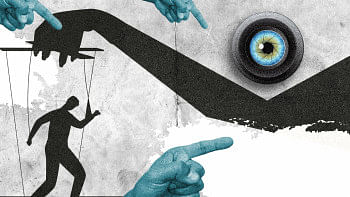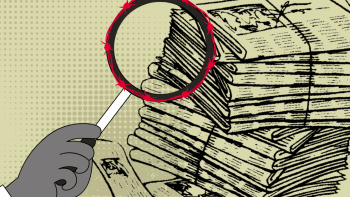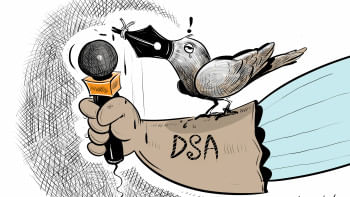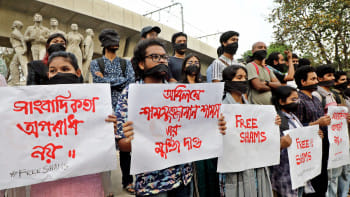Government’s stubborn attitude on DSA sends ominous signal

The news that the Office of the United Nations High Commissioner for Human Rights (OHCHR) has recommended repealing two sections and amending eight sections of the Digital Security Act (DSA) is not surprising. These sections and many other provisions of the draconian law were already criticised by human rights activists of Bangladesh since the law was in the making in early 2018. The two sections the OHCHR recommended to be repealed are sections 21 and 28, and the ones that have been recommended to be amended are sections 8, 25, 27, 29, 31, 32, 43 and 53.
It may be recalled that when the government took the initiative to pass this law in the wake of the 2018 elections, there were extensive discussions and protests from various quarters about these provisions. On September 29, 2018, the Editors' Council issued a statement explaining its concerns over the DSA, identifying some fundamental flaws in nine sections (8, 21, 25, 28, 29, 31, 32, 43 and 53) of the act. In the last four and a half years, those who have followed the state of human rights, right to expression of the citizens, and freedom of the press in Bangladesh have repeatedly said this law as a whole and some sections in particular are unacceptable, and are inconsistent with the international conventions signed by the country.
The two sections the OHCHR has asked to repeal were widely discussed because they are opaque, include vague concepts, and are deemed to have a large scope for political use. Section 21 states, "If any person, by means of digital medium, makes or instigates to make any propaganda or campaign against the liberation war of Bangladesh, spirit of liberation war, father of the nation, national anthem or national flag, then such act of the person shall be an offence," and that he or she will be punished with imprisonment for a term not exceeding 10 years, or with a fine not exceeding Tk 1 crore, or both. A second time or repeated offence will land the offender with imprisonment for life, or with a fine of Tk 3 crore, or both.
Section 28 of the DSA says, "If any person or group willingly or knowingly publishes or broadcasts or causes to publish or broadcast anything in website or any electronic format which hurts religious sentiment or values, with an intention to hurt or provoke the religious values or sentiments, then such act of the person shall be an offence." The punishments have been set at imprisonment for a term not exceeding five years, or with a fine not exceeding Tk 10 lakh, or both. Repeat of such offence will lead to imprisonment for a term not exceeding 10 years, or with a fine not exceeding Tk 20 lakh, or both.
The scope of such a law is so wide that any person can accuse anyone of violating this law, and therefore they can be arrested, imprisoned or even be pronounced guilty. In research conducted since January 2020 by the Centre for Governance Studies (CGS), we have tracked how these DSA sections have been used. In my research on the use of the DSA since it came into effect, the four sections we found to have been most widely used were sections 25, 29, 31 and 35. Three of our published reports (April 2021, April 2022, and January 2023) highlighted different aspects of it.
Under this project, we have been able to collect complete data of 1,295 cases filed between October 2018 and March 2023. In these cases, 3,644 people were accused and 1,378 of them were arrested. While many of the detainees are out on bail, many are under trial. Writer Mushtaq Ahmed died in jail while in custody. Mushtaq was languishing in jail for more than 10 months and courts had repeatedly denied his bail applications. We don't know how many are facing the same situation as the government is unwilling to share the information.
Despite the data showing a clear pattern of the DSA being used as a tool to instil fear in society, protests of civil society members against the wanton use of the law, demand by human rights organisations to repeal the law altogether, and the OHCHR recommendations to suspend it, the government is doubling down. This only indicates that the law is likely to be used far more widely by the government and its supporters ahead of the elections. This is an ominous signal.
The information we have gathered shows that 18 cases have been filed under Section 21, in which 242 people have been accused and 19 have been detained. The information we could gather about the professional background of the accused was of 112 people, of whom politicians were the largest victims (81), followed by lawyers (11). Forty-four cases have been filed under Section 28. A total of 118 have been accused and 25 have been arrested. We were able to gather professional identities of 34 people, which showed that most of the accused are journalists and teachers, with six cases each; two and three people were arrested, respectively. Politicians follow them to be accused and detained. An analysis of the statistics shows that 21.19 percent of the accused were arrested.
The use of the sections for which the OHCHR has called for amendments (8, 25, 27, 29, 31, 32) are quite concerning. Section 25 is a case in point. Our research shows that 212 cases have been filed, 688 have been accused and 141 have been detained. There is a similar trend in the application of Section 29; under this section, 211 cases have been filed and 677 people have been accused. Section 29 states, "If any person publishes or transmits any defamatory information as described in section 499 of the Penal Code (Act XLV of 1860) on a website or in any other electronic format, he shall be punished with imprisonment for a term not exceeding 3 (three) years, or with a fine not exceeding Taka 5 (five) lac, or both." Penal Code 500 through 501 have dealt with defamation and have the provision of punishment of up to two years of imprisonment.
But it has been found that after DSA's introduction in 2018, cases are being filed under this law instead of the Penal Code. This is in large measure due to the police's prompt action if a case is filed under the DSA. This is particularly true when a case is filed by the government or an activist of the ruling party. Besides, since most of the sections of the DSA are non-bailable, the persons arrested under the law remain in jail as pre-trial detainees for a long period – almost for an indefinite period. In our study, we have also found that the period of imprisonment becomes long and uncertain due to the police not filing the investigation report within the maximum stipulated period of 75 days. As such, various provisions of the DSA have become a tool for harassing rivals, particularly political opponents.
The OHCHR sent its recommendations in June last year, but there is no sign that the government is taking them into account. Moreover, the number of cases under this law has been increasing lately. Recently, there was an uproar at home and abroad after a case was filed against Prothom Alo Editor Matiur Rahman and journalist Samsuzzaman Shams under this act. Although the significance and importance of these two cases are enormous, in some measures they are not an exception.
The government and the leaders and activists of the ruling party are filing cases against their opponents almost every day somewhere in the country, and the accused are being detained without delay. These are signs that this trend will increase before the elections. Law Minister Anisul Huq told reporters last week that the law cannot be repealed in any way. Harsher words came from Information Minister Hasan Mahmud, who said in unequivocal terms that there was "no possibility of repealing the Digital Security Act," although the UN High Commissioner for Human Rights Volker Turk on March 31 called for an immediate suspension of the law.
Despite the data showing a clear pattern of the DSA being used as a tool to instil fear in society, protests of civil society members against the wanton use of the law, demand by human rights organisations to repeal the law altogether, and the OHCHR recommendations to suspend it, the government is doubling down. This only indicates that the law is likely to be used far more widely by the government and its supporters ahead of the elections. This is an ominous signal.
Ali Riaz is distinguished professor of political science at Illinois State University and a non-resident senior fellow of the Atlantic Council. He is currently affiliated with the Varieties of Democracy (V-Dem) Institute at Gothenburg University in Sweden as a visiting researcher.

 For all latest news, follow The Daily Star's Google News channel.
For all latest news, follow The Daily Star's Google News channel. 












Comments